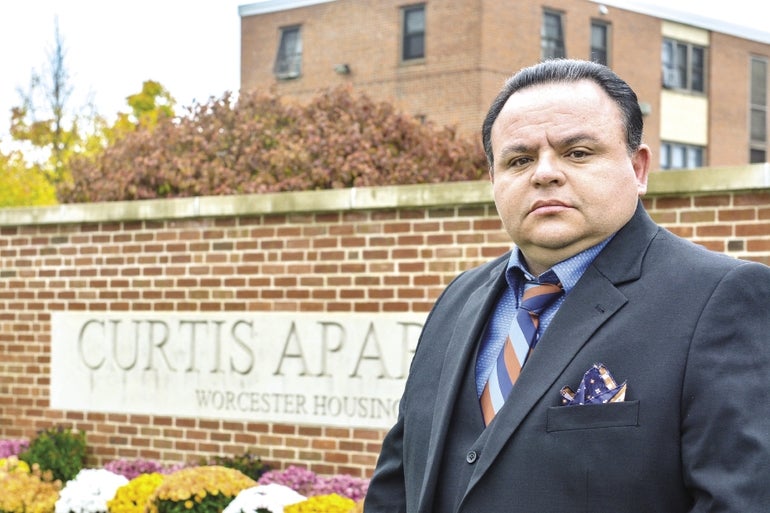Worcester’s largest landlord is stepping up its fight to increase housing stock for not only the city residents most in need, but for all residents who find themselves stretched thin by the region’s rising housing costs.
Get Instant Access to This Article
Subscribe to Worcester Business Journal and get immediate access to all of our subscriber-only content and much more.
- Critical Central Massachusetts business news updated daily.
- Immediate access to all subscriber-only content on our website.
- Bi-weekly print or digital editions of our award-winning publication.
- Special bonus issues like the WBJ Book of Lists.
- Exclusive ticket prize draws for our in-person events.
Click here to purchase a paywall bypass link for this article.
Worcester’s largest landlord is stepping up its fight to increase housing stock for not only the city residents most in need, but for all residents who find themselves stretched thin by the region's rising housing costs. And it's bringing in a powerful friend to help.
The Worcester Housing Authority, founded in 1949, is no longer just managing its existing properties, which were first built after World War II. WHA is partnering with at least one developer to expand the number of apartments available to residents, update units for its current tenants, and increase the income diversity of its developments and the surrounding neighborhood.
“We can assist in the affordable housing crisis by adding more affordable units,” WHA CEO Alex Corrales said. “Part of our vision is rather than go out and compete for land out in the city, let's take a look at our current portfolio … There may be opportunities for us to increase the number of units.”
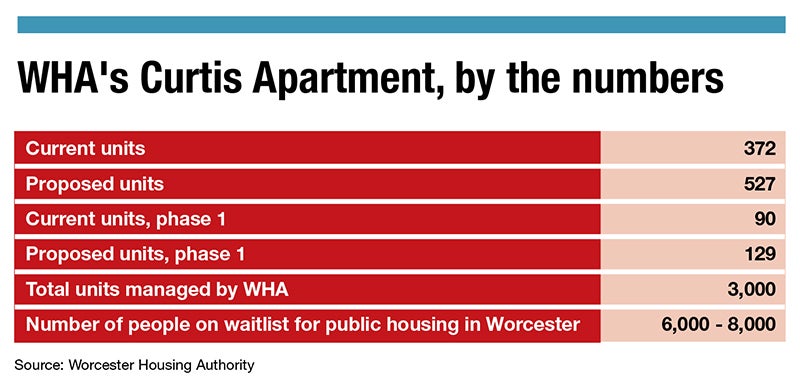
Between 2010 and 2020, the population of Worcester grew by 25,000, while 10,000 units of housing were built in the city, according to a report by the Worcester Regional Chamber of Commerce.
This increased demand has driven up the price of both renting and owning housing in the city
The median annual household income for Greater Worcester renters is $44,826 while the income required to afford a one-bedroom apartment at fair market rent is $46,480, according to the National Low Income Housing Coalition. The median sale price of a single-family home in Worcester rose 10% year-over-year in September, the latest monthly data in a two-year period with double-digit percent price increases, according to Peabody data firm The Warren Group.
WHA sees an opportunity to provide more housing to renters all along the income spectrum, said Corrales. WHA’s Booth Apartments, for example, has 44 one-bedroom units on seven acres, which could become 200 units, he said.
“Six years ago, I would have told you that we had no bandwidth for this kind of development. Our focus was more on cleaning up our own properties,” he said.
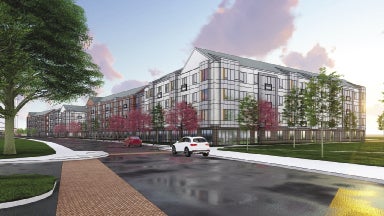
Working with a developer
Corrales has hired WHA Chief Operating Officer Peter Proulx to get the development aspect of the WHA moving, and Corrales plans to add staff for development.
“With each of our projects we expand our bandwidth, our potential of doing more with the next project,” said Proulx.
The first such project is the redevelopment of the Curtis Apartments in the Great Brook Valley neighborhood. The WHA is partnering with Boston developer Trinity Financial on the project.
Trinity Financial previously developed Courthouse Lofts, a 118-unit mixed-income development of the former Worcester County Courthouse on Main Street. The project, completed in 2021, offers 118-units to tenants of a range of incomes from 30% of the area median income to full market rate.
The company has partnered with housing authorities around Greater Boston, New York City, and Connecticut to redevelop old projects and build new affordable developments.
Curtis Apartments, built in 1951, is a 372-unit state family housing development, offering one-, two-, and three-bedroom apartments to residents making less than 30% AMI. The buildings do not have a sprinkler system, nor did they have elevators until they were added 20 years ago on the outside of buildings.
“It’s costing an awful lot of money just keeping the lights on. That’s part of the problem when you're maintaining an old property that is 75 years old,” said Corrales.
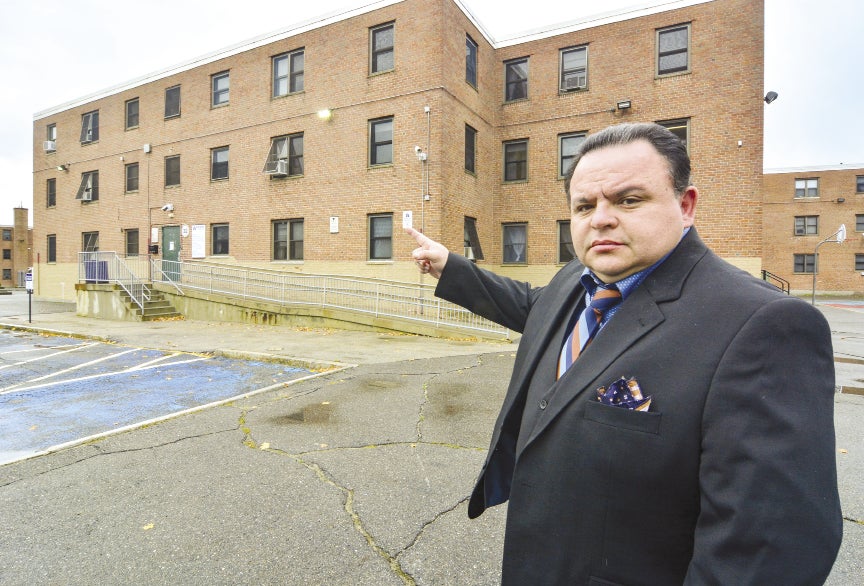
“And intended to be there for 40 years,” said Proulx.
The proposed redevelopment would replace the existing buildings with modern structures and add 155 units. The redevelopment will add units affordable to tenants earning 60% and 80% AMI, and some market-rate units.
The project will take place in phases, with phase one expected to start in summer or fall of 2023.
In the $90-million phase one, three buildings containing 90 units will be demolished and replaced with two buildings offering 129 units, 90 of which will be for the current tenants and the others making less than 30% AMI. The capacity for accessible units will expand as the new buildings will have elevators.
“This is a good model for future development: how they involve the community, their level of communication,” said Sean Rose, Worcester city councilor, whose District 1 includes the Curtis Apartments.

Rose worked near municipalities in Greater Boston and Connecticut where Trinity previously partnered with housing authorities, and he said Trinity effectively reached out to the community.
Keeping people housed
Trinity has formed a corporate entity with WHA to develop the property, which will lease the land from WHA. Housing authorities can not borrow against their own properties, so the partnership with Trinity allows for $160 million in financing for the project.
“We are in this for the long haul,” said Patrick Lee, CEO of Trinity Financial.
Trinity’s corporate entity will have 75-99-year leases on the properties. Lee said this guarantees the affordability of the apartments, and in a worst-case scenario, if the WHA feels that Trinity is not doing its job managing the property, it can hire another property manager.
Trinity will relocate residents, demolish the existing buildings, build the new buildings, and manage the development going forward. The developer works with a Boston-based organization called Housing Opportunities Unlimited to find temporary housing for residents.
“Housing Opportunities Unlimited personally meets with every single household, and they do an assessment of what that family needs, what are their desires. Some folks may want to stay in their neighborhood or some folks may want to go to another neighborhood because that’s where their support system is,” said Corrales.
The situation is different than elsewhere in the city where older housing in need of repair is purchased by developers, who then displace the residents, said Leah Bradley, CEO of the Central Massachusetts Housing Alliance, which is dedicated to preventing homelessness.
The WHA residents are “not going to lose housing. Of course they’ll have to leave the units, but the WHA has a great plan to phase it in so that folks can remain housed,” Bradley said.
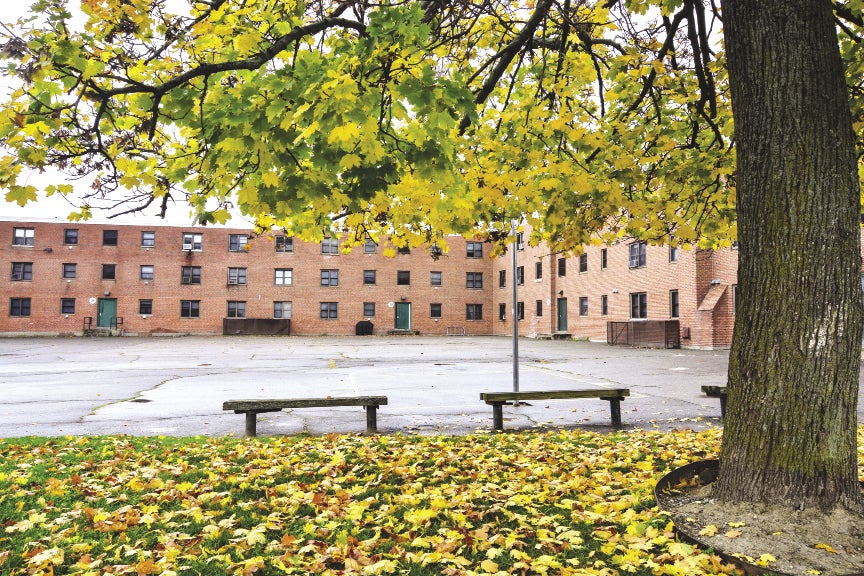
Changing the neighborhood
The redevelopment with more mixed-income units will bring income and racial diversity of income to the Great Brook Valley neighborhood.
“The goal is to have as much diversity on one spot as possible,” Rose said. “The waitlists for public housing are long, but people in the workforce at 60, 70, 80% AMI also need housing.”
By creating a neighborhood with more mixed incomes, Corrales said the new Curtis Apartments can break up a concentration of poverty and create a more vibrant community.
“For a number of years, I would say that there were a number of folks in the community that were happy just to have every poor person go live in Great Brook Valley,” he said.
If people only see poverty around them, then that’s all they know, Bradley said. Mixed-rate neighborhoods allow people to see the way others live and can help break the cycle of poverty.
“It's about taking action on equity. Because most of the people who are living in poverty are people of color,” she said.
Having more equity within a neighborhood opens up the opportunities available to the people within it.
“Traditionally the way that poverty and, to an extent, racial segregation has worked is we tend to create neighborhoods of a certain opportunity. Where you live determines a lot: your health outcomes, the education you get, services you receive, opportunities you have,” said Etel Haxhiaj, Worcester city councilor for District 5. “Everybody deserves the dignity of living in all areas of the city. I want to figure out how to replicate this model in all areas of the city.”

Haxhiaj may see how the WHA’s approach works in her district. On Nov. 3, WHA released a request for proposals, seeking a partner to redevelop the 34-building Lakeside Apartments in Haxhiaj’s district. WHA wants to replace the existing 202 low-income apartments with 248 low-income apartments and an additional unspecified number of units affordable to residents at 60% and 80% area median income, as well as apartments or first-time homeowner units that may include market-rate units, which will not exceed 5% of total.
“We want to be part of the solution. If you’re going to have a conversation about affordable housing in the city of Worcester, we should be one of the first people you invite to the table. The staff I have here, 250 people, know Worcester better than anyone,” said Corrales. “Being able to add on units to properties, looking at all of our properties and seeing how we can increase the number of units there, that’s our way of being part of the solution. We hope this is the first of many projects we’ll be able to do.”
